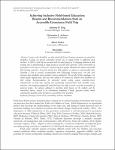Achieving Inclusive Field-based Education: Results and Recommendations from an Accessible Geoscience Field Trip
| dc.contributor.author | Feig, AD | |
| dc.contributor.author | Atchison, CL | |
| dc.contributor.author | Stokes, Alison | |
| dc.contributor.author | Gilley, B | |
| dc.date.accessioned | 2018-03-08T14:29:13Z | |
| dc.date.available | 2018-03-08T14:29:13Z | |
| dc.date.issued | 2019-03-06 | |
| dc.identifier.issn | 1527-9316 | |
| dc.identifier.issn | 1527-9316 | |
| dc.identifier.uri | http://hdl.handle.net/10026.1/11028 | |
| dc.description.abstract |
<jats:p>Learners with disabilities are often denied field-based learning experiences in naturalistic disciplines. Geology can present substantial barriers due to rugged terrain in difficult-to-reach locations. In 2014, a field trip was executed with the dual purpose of 1) designing inclusion in field learning and 2) demonstrating to college faculty an accessible field experience. Direct observations of participants on the trip, as well as pre- and post-trip focus groups, illuminate the student and faculty field learning experience. Geoscience faculty have little guidance or support in understanding what disability is, how to reconcile accommodation with field-geology learning goals, and they cited instances where disability service providers acted as gatekeepers. The net effect of these ontologies is to reduce faculty empathy with, and thus their ability to be inclusive of, students with disabilities in field settings. Recommendations for teachers include taking campus disability-services administrators on field trips, opening and maintaining communications with disability service providers, and designing pedagogically sound field trips that align as much as possible to principles of universal design. An advocacy approach is described, which focuses on the students and the educational process, instead of on institutional compliance. Finally, geoscience faculty should conceptualize disability service providers as accessibility service providers.</jats:p> | |
| dc.format.extent | 66-87 | |
| dc.language.iso | en | |
| dc.publisher | Indiana University | |
| dc.subject | Health Services | |
| dc.subject | Clinical Research | |
| dc.subject | 4 Quality Education | |
| dc.title | Achieving Inclusive Field-based Education: Results and Recommendations from an Accessible Geoscience Field Trip | |
| dc.type | journal-article | |
| plymouth.issue | 2 | |
| plymouth.volume | 19 | |
| plymouth.publisher-url | https://josotl.indiana.edu/ | |
| plymouth.publication-status | Accepted | |
| plymouth.journal | The Journal of Scholarship of Teaching and Learning | |
| dc.identifier.doi | 10.14434/josotl.v19i1.23455 | |
| plymouth.organisational-group | /Plymouth | |
| plymouth.organisational-group | /Plymouth/00 Groups by role | |
| plymouth.organisational-group | /Plymouth/00 Groups by role/Academics | |
| plymouth.organisational-group | /Plymouth/Faculty of Science and Engineering | |
| plymouth.organisational-group | /Plymouth/Faculty of Science and Engineering/School of Geography, Earth and Environmental Sciences | |
| plymouth.organisational-group | /Plymouth/REF 2021 Researchers by UoA | |
| plymouth.organisational-group | /Plymouth/REF 2021 Researchers by UoA/UoA23 Education | |
| dcterms.dateAccepted | 2017-11-20 | |
| dc.identifier.eissn | 1527-9316 | |
| dc.rights.embargoperiod | Not known | |
| rioxxterms.version | Accepted Manuscript | |
| rioxxterms.versionofrecord | 10.14434/josotl.v19i1.23455 | |
| rioxxterms.licenseref.uri | http://www.rioxx.net/licenses/all-rights-reserved | |
| rioxxterms.type | Journal Article/Review |


